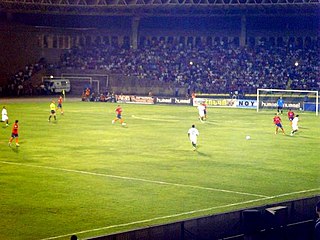
Standings and results for Group A of the UEFA Euro 2008 qualifying tournament.

The 2010 FIFA World Cup qualification UEFA Group 5 was a UEFA qualifying group for the 2010 FIFA World Cup. The group comprised European champions Spain, Turkey, Belgium, Bosnia and Herzegovina, Armenia and Estonia.
The 2006 FIFA World Cup qualification UEFA Group 7 was a UEFA qualifying group for the 2006 FIFA World Cup. The group comprised Belgium, Bosnia and Herzegovina, Lithuania, San Marino, Serbia and Montenegro and Spain.
The qualifying rounds for the 2008–09 UEFA Champions League began on 15 July 2008. In total, there were three qualifying rounds which provided 16 clubs to join the group stages.
Standings and results for Group 2 of the UEFA Euro 2004 qualifying tournament.
This page shows the standings and results for Group B of the UEFA Euro 2012 qualifying tournament.
The 2014 FIFA World Cup qualification UEFA Group G was a UEFA qualifying group for the 2014 FIFA World Cup. The group comprised Greece, Slovakia, Bosnia and Herzegovina, Lithuania, Latvia and Liechtenstein.
The UEFA Euro 2016 qualifying Group B was one of the nine groups to decide which teams would qualify for the UEFA Euro 2016 finals tournament. Group B consisted of six teams: Bosnia and Herzegovina, Belgium, Israel, Wales, Cyprus, and Andorra, where they played against each other home-and-away in a round-robin format.
The UEFA Euro 2016 qualifying Group G was one of the nine groups to decide which teams would qualify for the UEFA Euro 2016 finals tournament. Group G consisted of six teams: Russia, Sweden, Austria, Montenegro, Moldova, and Liechtenstein, where they played against each other home-and-away in a round-robin format.
The 2018 FIFA World Cup qualification UEFA Group E was one of the nine UEFA groups for 2018 FIFA World Cup qualification. The group consisted of six teams: Romania, Denmark, Poland, Montenegro, Armenia, and Kazakhstan.
The 2018 FIFA World Cup qualification UEFA Group G was one of the nine UEFA groups for 2018 FIFA World Cup qualification. The group consisted of six teams: Spain, Italy, Albania, Israel, Macedonia, and Liechtenstein.

The 2018 FIFA World Cup qualification UEFA Group H was one of the nine UEFA groups for 2018 FIFA World Cup qualification. The group consisted of six teams: Belgium, Bosnia and Herzegovina, Greece, Estonia, Cyprus, and Gibraltar.

The 2019 UEFA European Under-19 Championship was the 18th edition of the UEFA European Under-19 Championship, the annual international youth football championship organised by UEFA for the men's under-19 national teams of Europe. Armenia, which was selected by UEFA on 9 December 2016, hosted the final tournament.
The 2018–19 UEFA Nations League D was the fourth and lowest division of the 2018–19 edition of the UEFA Nations League, the inaugural season of the international football competition involving the men's national teams of the 55 member associations of UEFA.
This page summarises the Champions Path matches of 2019–20 UEFA Europa League qualifying phase and play-off round.
This page summarises the Champions Path matches of the 2020–21 UEFA Europa League qualifying phase and play-off round.
The 2022 FIFA World Cup qualification UEFA Group J was one of the ten UEFA groups in the World Cup qualification tournament to decide which teams would qualify for the 2022 FIFA World Cup finals tournament in Qatar. Group J consisted of six teams: Armenia, Germany, Iceland, Liechtenstein, North Macedonia, and Romania. The teams played against each other home-and-away in a round-robin format.
The 2022–23 UEFA Nations League B was the second division of the 2022–23 edition of the UEFA Nations League, the third season of the international football competition involving the men's national teams of the 55 member associations of UEFA.
Group D of UEFA Euro 2024 qualifying was one of the ten groups to decide which teams would qualify for the UEFA Euro 2024 final tournament in Germany. Group D consisted of five teams: Armenia, Croatia, Latvia, Turkey and Wales. The teams played against each other home-and-away in a round-robin format.
Group J of UEFA Euro 2024 qualifying was one of the ten groups to decide which teams would qualify for the UEFA Euro 2024 final tournament in Germany. Group J consisted of six teams: Bosnia and Herzegovina, Iceland, Liechtenstein, Luxembourg, Portugal and Slovakia. The teams played against each other home-and-away in a round-robin format.



